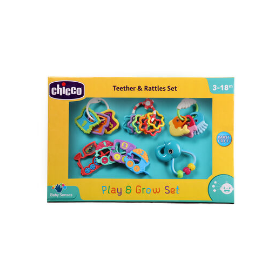From Blocks to Puzzles: The Best Toys for Toddlers to Boost Cognitive Skills

When it comes to early childhood development, toys play a crucial role in enhancing cognitive skills. For toddlers, engaging with the right toys can significantly boost their problem-solving abilities, memory, and critical thinking skills. In this article, we will explore some of the best toys for toddlers that can help stimulate their cognitive development, focusing on blocks, puzzles, and other engaging options.
1. Building Blocks
Why They're Beneficial
Building blocks are a classic choice for fostering cognitive skills in toddlers. These toys encourage creativity and imagination while also developing spatial awareness and fine motor skills.
Key Benefits
-
Problem-Solving: As toddlers experiment with different configurations, they learn to solve problems and make decisions about balance and structure.
-
Spatial Awareness: Understanding how to manipulate blocks helps toddlers grasp concepts of space and distance.
-
Creativity: Blocks allow for open-ended play, where children can create their structures, stimulating imaginative thinking.
Recommended Options
-
Wooden Blocks: Durable and safe, wooden blocks come in various shapes and sizes, encouraging toddlers to explore.
-
Magnetic Blocks: These blocks feature magnets that help toddlers create unique structures while also introducing them to basic physics concepts.
2. Puzzles
Why They're Important
Puzzles are fantastic for developing cognitive skills because they challenge toddlers to think critically and work through challenges.
Key Benefits
-
Problem-Solving: Completing a puzzle requires toddlers to use logic and reasoning to find the correct pieces and fit them together.
-
Fine Motor Skills: Manipulating puzzle pieces helps develop hand-eye coordination and dexterity.
-
Memory Enhancement: As toddlers work through puzzles, they strengthen their memory by recalling where pieces fit.
Recommended Options
-
Chunky Puzzles: These puzzles feature large, easy-to-handle pieces that are perfect for small hands and help develop grasping skills.
-
Shape Sorters: A twist on traditional puzzles, shape sorters require toddlers to match shapes to their corresponding slots, enhancing problem-solving abilities.
3. Stacking Toys
Why They're Effective
Stacking toys, such as rings and cups, are excellent tools for cognitive development. They help toddlers understand concepts like size, order, and balance.
Key Benefits
-
Cognitive Skills: Stacking requires toddlers to think critically about how to balance pieces and create a stable structure.
-
Sorting and Categorization: Toddlers learn to sort by size and color, enhancing their categorization skills.
-
Fine Motor Development: Grasping and stacking pieces strengthen fine motor skills.
Recommended Options
-
Stacking Rings: These colorful rings encourage toddlers to stack them in order of size, promoting logical thinking.
-
Nesting Cups: These cups can be stacked and nested, allowing toddlers to explore different arrangements and learn about size relationships.
4. Interactive Learning Toys
Why They're Engaging
Interactive toys that combine play with learning can captivate toddlers and keep them engaged for longer periods.
Key Benefits
-
Multi-Sensory Learning: These toys often incorporate lights, sounds, and textures, appealing to various senses and enhancing cognitive engagement.
-
Language Skills: Many interactive toys encourage verbal interaction, helping toddlers develop vocabulary and language skills.
-
Cause and Effect Understanding: Playing with interactive toys helps toddlers understand cause-and-effect relationships through experimentation.
Recommended Options
-
Learning Tablets: Kid-friendly tablets with educational apps introduce toddlers to numbers, letters, and shapes in a fun way.
-
Musical Instruments: Simple instruments, like xylophones or tambourines, promote auditory learning while encouraging creativity.
5. Imaginative Play Toys
Why They Matter
Toys that encourage imaginative play allow toddlers to explore their creativity and develop social skills.
Key Benefits
-
Role-Playing: Imaginative toys help toddlers understand social roles and scenarios, enhancing their cognitive and emotional intelligence.
-
Language Development: Engaging in pretend play with others promotes verbal communication and negotiation skills.
-
Problem-Solving: Creating scenarios and resolving conflicts during play helps toddlers learn to navigate social situations.
Recommended Options
-
Dollhouses: These toys enable toddlers to enact various social situations, helping them understand different perspectives.
-
Pretend Play Sets: Kitchen sets, tool kits, and doctor kits foster imaginative play, allowing toddlers to experiment with different roles.
Conclusion
Choosing the right toys for toddlers is vital for boosting their cognitive skills. From building blocks to puzzles and interactive learning toys, there are countless options available that not only entertain but also educate. By providing toddlers with these engaging toys, parents can create an enriching play environment that fosters critical thinking, problem-solving, and creativity. Investing in the right toys during these formative years lays a strong foundation for a child's cognitive development, setting them up for success in their future learning endeavors.
- Industry
- Art
- Causes
- Crafts
- Dance
- Drinks
- Film
- Fitness
- Food
- Spiele
- Gardening
- Health
- Home
- Literature
- Music
- Networking
- Other
- Party
- Religion
- Shopping
- Sports
- Theater
- Wellness
- News


